This is the era of 8 million won as an annual average tuition for university. Are you learning enough at university to justify paying this much money? What is true learning at university? How do university students study? We want to know about their academic lives.
Then, how do students study at Seoul National University, the school that the brilliant minds of Korea go to? An EBS program, 「Docuprime」, broadcasted a program titled . The TV program examined which students get high grades at Seoul National University where Korea’s best students gather. Lee Hye-jeong, the manager of the Institute for Education and Innovation, did a survey about the ways to study targeting students who get high grades. She wanted to help students who have difficulty in studying. But she couldn’t distribute the results of the survey to students. The reason is that the results of survey were completely contrary to the expectations of her and her research team. Most students who get high grades answered that they record lecture contents using their smartphones and type the contents of classes using laptops instead of notebooks to write down every word the professor says in class. That means that they can get high scores if they write down not their own opinions but everything that their professors say in class. About this style of learning, one student of Seoul National University said, “This is the way I studied when I was a high school student. It is as though I don’t exist, and I’m like a parrot repeating the words of the professor.” The manager, Lee Hye-jeong, said, “I started this research with great expectations, but it showed the serious problem of university education. I wonder if we have to say to our children that they have to abandon their own ideas and only follow the opinions of professors.”
This research highlights the problem of the generally passive education system of Korea as well as the education systems of universities including Seoul National University. We have been studying to select between simplistic answer choices like “Choose only what is right” or “Choose only what is not right.” Also, we unthinkingly accept the professor’s opinion because we have been trained to do this by the education system for a long time. If so, is this true only for students of Seoul National University? How do students of Kyonggi University study? To answer this question, we did a survey targeting 90 students of Kyonggi University.
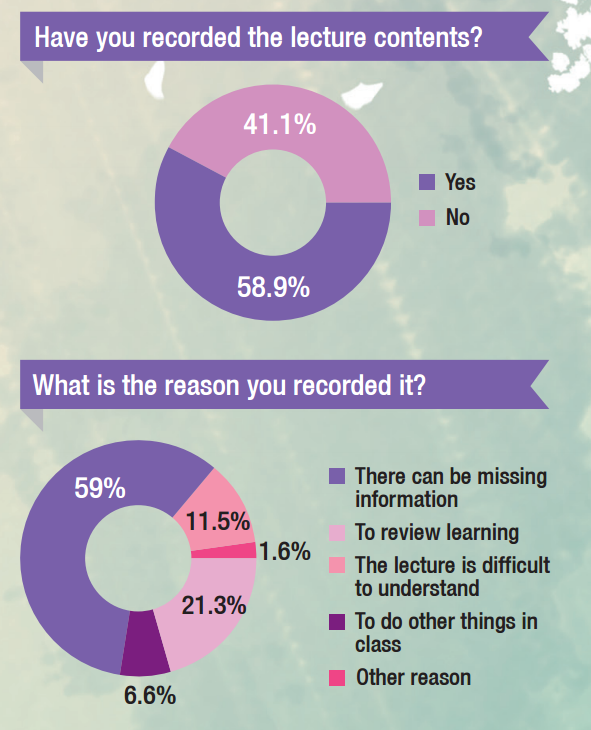
First, we asked the students if they have recorded lecture contents while taking classes at our school. As a result of the survey, 58.9% of students, 53 students of the total 90 students, answered that they have recorded lecture contents and 41.1% of students, 37 students, answered that they haven’t recorded lectures. We asked the students who have recorded lecture contents the reason why they do that. About 59% of students said that “they can miss information if they don’t record” while the reasons “to review learning” and “the lecture is difficult to understand” accounted for 21.3% and 11.5%, of responses, respectively. Most of the students tended to record lecture contents to not miss important contents and to review learning because they can take a class only one time. Also, we asked students if they have gotten high grades when they wrote down every word that the professor said in class. About 50.6% of students said “Yes” and about 49.4% of students said “No” in answer to this question. This shows that there are tests in which students should write down all of the words that professors say in class and shouldn’t write their own opinions on the test paper in our school. Then, what do students of Kyonggi University think about this style of tests?
1. Have you recorded the lecture contents?
-Yes 58.9%
-No 41.1%
2. What is the reason you recorded it?
-There can be missing information 59%
-To review learning 21.3%
-The lecture is difficult to understand 11.5%
-To do other things in class 6.6%
-Other reason 1.6%
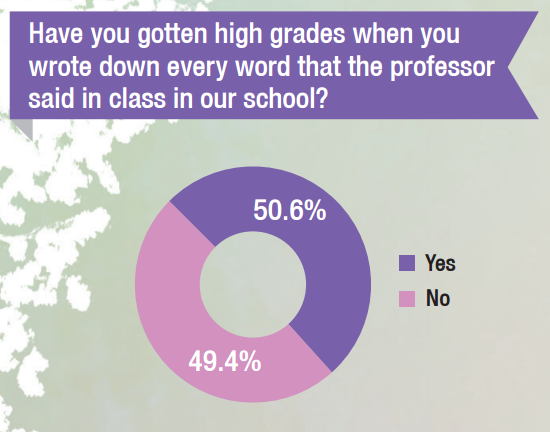
Miss J., who is a second year student and belongs to the College of Social Sciences, said “I work very hard in class and study a lot with my textbooks. So, I wrote answers to every question on my test. However, my grade was lower than my expectation. When I talked to my friend, I found out that my friend got a good grade by writing down every word that the professor said in class. I think that effective studying is understanding the contents, but I wonder if I have to follow the opinions of my professor to get a high grade.” As a result of the survey, we discovered that many students like Miss J. generally think negatively about these tests in that students have to write down every word of the professor in class in order to do well. Also, they recognized the problems of university education. Specifically, students made the following comments (1) “The tests don’t accommodate various opinions of students,” (2) “It isn’t genuine education because if I write down an idea that is different from the professor’s opinion, I might get a lower grade,” (3) “I think that it is not good because it can narrow the scope of my thinking and reduce learning and knowledge acquisition” and (4) “It is a prolongation of teaching by rote.” On the other hand, there were some students that thought positively about it. Some students answered that it was good because students who study hard in class can get a high grade, and other said writing down what the professor said in class is the best way of testing if the contents are theoretical. Most students tend to recognize the negative aspects of these tests but feel obliged to accept this way of testing. The reason is that writing down their own opinions is a dangerous game because it might result in receiving a low grade. Eventually, they become reluctant to raise their voices in criticism, and instead repeat the professor’s thinking like parrots. However, in the long run, this type of education doesn’t bring out good results. Universities should recognize the problems of this education system and construct a system of education and testing that bring out students’original and creative thinking. Indeed, as a result of the survey question about the best style of test, the number one response, which was selected by 36.7% of students, was a descriptive type of test in which students apply their ideas to a theory. Finally, these results suggest that students want to express their opinions about learning.
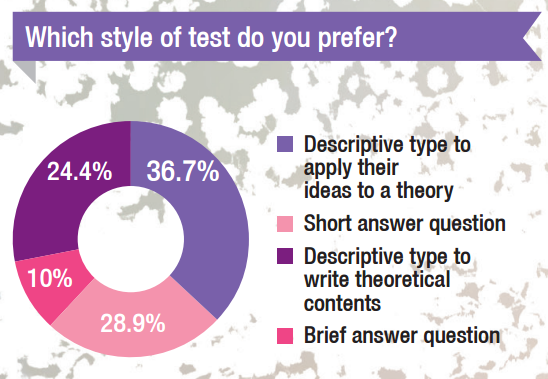
3. Have you gotten high grades when you wrote down every word that the professor said in class in our school?
-Yes 50.6%
-No 49.4%
4. Which style of test do you prefer?
-Descriptive type to apply their ideas to a theory 36.7%
-Short answer question 28.9%
-Descriptive type to write theoretical contents 24.4%
-Brief answer question 10%
Now, let’s look at what lectures students take. We did a survey targeting Kyonggi University students about what factors matter when they choose a class to take to find out the attitudes of students taking classes. The greatest number of students, 71.1%, chose “the class in which I can a good grade.” This was followed by “the class that I’m interested in,” which was chosen by 66.7% of students. About 34.4% of students chose “the class of a professor who I like or whose teaching I respect,” which means that awareness about professors is an important factor in taking classes. The choice “the class in which students can get useful knowledge for the future,” which we expected that most students would choose, accounted for about 28.9% of response. With regard to other factors, “the class that is easy to understand because I already know the contents” accounted for about 15.6% of response while “the class that finishes early” and “the class that includes various activities” accounted for 14.4% and 13.3% of reponses, respectively. In addition, we asked students what was most important in their school lives. According to the results, 46.7% of students answered that “a high grade” is the most important thing while 34.4% of students chose “getting useful knowledge for the future.” Moreover, about 13.3% of students chose “having various experiences” and 3.3% selected “learning executive abilities such as how to deliver a presentation.” From these two questions, we discovered that students tend to prefer high grades to knowledge for the future in their school lives. The image of university students that people usually think of is students reading all kinds of books or theses and establishing their own opinions and thinking constantly about learning. This is because the time at university is a time when students store up knowledge for the future and prepare to go into the world. But these days many students focus on getting high grades rather than acquiring knowledge. Ultimately, this phenomenon shows the social problem that students don’t have a choice but to consider the result of testing to be more important than the process of preparing for employment. After all, what is considered important in employment is the “outcomes” that students made than “themselves.”
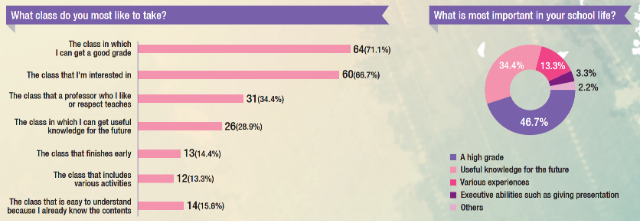
5. What class do you most like to take?
-The class in which I can get a good grade 71.1%
-The class that I'm interested in 66.7%
-The class that a professor who I like or respect teaches 34.4%
-The class in which I can get useful knowledge for the future 28.9%
-The class that finishes early 14.4%
-The class that includes various activities 13.3%
-The class that is easy to understand because I already know the contents 15.6%
6. What is most important in your school life?
-A high grade 46.7%
-Useful knowledge for the future 34.4%
-Various experiences 13.3%
-Executive abilities such as giving presentation 3.3%
-Others 2.2%
Then, is the way to get a job only to study at a university? It isn’t. University students can do many things such as experiencing international activities, joining clubs and meetings, and going on domestic and overseas trips. But if I had to select one activity that is the most important for them, I think that it is of course reading books. As many people know, by reading books you can discover things that are different from things that you know and the world that you live in. That is, by reading books, you can indirectly experience many things that you can’t normally experience. Also, you can expand the scope of your thinking while criticizing or accommodating others’ opinions. By doing this, repeatedly, you can form your own beliefs and values, and develop your creativity because thinking makes your brain work effectively. Therefore, reading books is a very important activity for students. If so, how well are Kyonggi University students using this opportunity to read books? To find out, we asked them how many books they read a month.
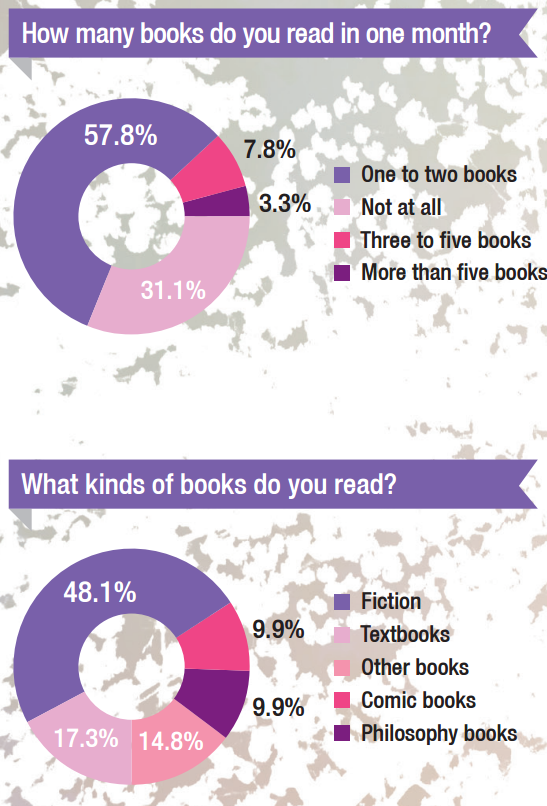
As a result of the survey, we discovered that 31.1% of the 90 students who answered the question selected “We rarely read books,” 57.8% of the students answered that they read “one to two books,” 7.8% of the students said that they read “three to five books” and only 3 students said that they read “more than five books.” This shows that more than 9 students out of 10 students read about 10 books per year. As we get older, we acquire more knowledge, but we move further away from the wisdom obtained from books. Then, what kinds of books do students read? To explore this issue, we asked the students who read books what kinds of books they read. About 48.1% of respondents, or 39 students, answered that they read “fiction.” This was followed by “textbooks” and “books that are related to humanity/society” with about 15% each. About 9.9% of students said that they read “philosophy books” and another 9.9% chose “comic books.” Because more than 70% of the students answered that they read “fiction,” “comic books,” or “textbooks,” we learned many students tend to read books to study their majors or as a hobby. Reading fiction or comic books is not bad, but I would like to recommend books that are filled with social issues or philosophical content for students. They need to develop the ability to think by accommodating or sometimes criticizing others’ opinions and these books enable it. Furthermore, the important thing that a person has to do as adult is to establish his or her own values about life and have the ability to judge well. We can develop these abilities by reading books. However, most people tend to feel burdened by reading books for various reasons. What are the reasons Kyonggi University students don’t read books?
7. How many books do you read in one month?
-One to two books 57.8%
-Not at all 31.1%
-Three to five books 7.8%
-More than five books 3.3%
8. What kinds of books do you read?
-Fiction 48.1%
-Textbooks 17.3%
-Other books 14.8%
-Comic books 9.9%
-Philosophy books 9.9%
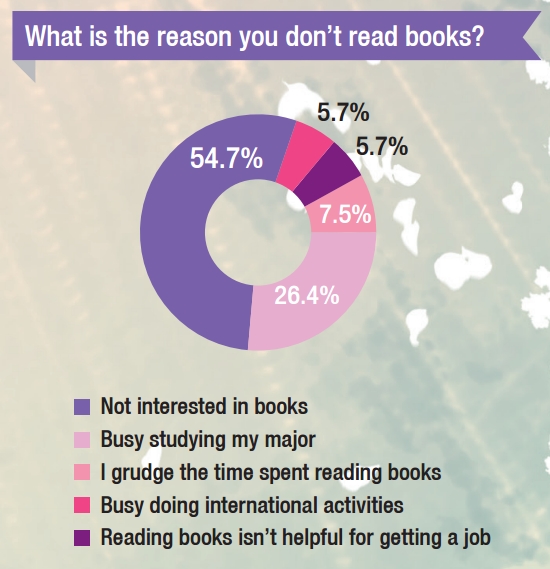
About 26.4% of students answered that they don’t read books because they are busy studying their majors. Another 13.2% of students answered that they don't read because they don’t want to waste time reading books or they think reading books isn’t helpful for getting a job. About 5.7% of students said that they are busy doing international activities. However, “because they are not interested in books” came in first with about 54.7% of students choosing it. Above all, the results show that books have become less important than grades and other qualifications for students who have employment ahead of them. Many students pay no attention to reading books because they are busy studying or have many things to do. However, what they must know is that although they might grudge the time spent reading books while preparing for employment, it will be more helpful for improving life, especially social life, than anything else. Of course, the effect of reading books doesn’t happen immediately. Maybe, we’ll have to invest a lot of time in reading books in order to develop mature thinking. But flexibility of thinking and mature thinking are more valuable than any qualifications that most students get when preparing for getting a job, and besides they will be helpful not only after employment, but thoughout one’s whole life. Many companies say that there are many job seekers, but they can’t find any talented persons among them. The English scores that everyone has, the language training that everyone has done, the international activities that everyone has experienced and so on, tend to be highly similar. Every student tries to acquire qualifications that are the same as others’. However, can these things be compared with the wisdom found in many books that one has read during his whole life? Possibly, companies may think the talented person is one who has found and walked along his own path, unlike others. The reading of books that we think of as wasting time can be one special qualification. We hope students will invest time and effort in reading books and think about the life for themselves because the fruit gained will be more valuable than anything.
9. What is the reason you don’t read books?
-Not interested in books 54.7%
-Busy studying my major 26.4%
-I grudge the time spent reading books 5.7%
-Busy doing international activities 5.7%
-Reading books isn’t helpful for getting a job 7.5%
Many students experience frustration in front of the wall called employment. Most of them complain about the fact that it is hard to get a job despite their best efforts. But are we really making our best effort? Do we get real learning for ourselves and our lives? I think that the life devoted to finding our real self is more important than the life in which one follows what others do. I hope Kyonggi University students will find their own colors and achieve outcomes that they want during the rest of their school lives.
 Freedom Given to Youth: An Opportunity for Choice or a Burden of Constraint?
“Are we truly free today?” Classical literature is far more than time-honored stories. It offers profound insights into human nature and society that transcend time, remaining a valuable resource for examining the challenges our world faces today. This article will draw on George Orwell’s 1984 and Charles Dickens’ Oliver Twist to explore the contemporary issues of youth housing and the emergence of a surveillance society ...
Freedom Given to Youth: An Opportunity for Choice or a Burden of Constraint?
“Are we truly free today?” Classical literature is far more than time-honored stories. It offers profound insights into human nature and society that transcend time, remaining a valuable resource for examining the challenges our world faces today. This article will draw on George Orwell’s 1984 and Charles Dickens’ Oliver Twist to explore the contemporary issues of youth housing and the emergence of a surveillance society ...

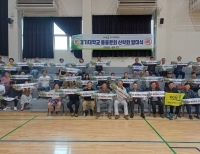 [단신] 산악회, 본교 동문의 버팀목이 될 수 있도록
[단신] 산악회, 본교 동문의 버팀목이 될 수 있도록
 [사회메인] 노인 인구 1,000만 시대, 준비 없는 사회가 불안해
[사회메인] 노인 인구 1,000만 시대, 준비 없는 사회가 불안해
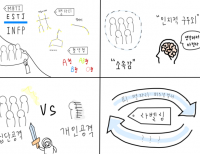 [네컷만화] 라벨링 문화
[네컷만화] 라벨링 문화
 [진리터] 결국 우리 모두 돌아볼 것이니
[진리터] 결국 우리 모두 돌아볼 것이니

 목록
목록
















